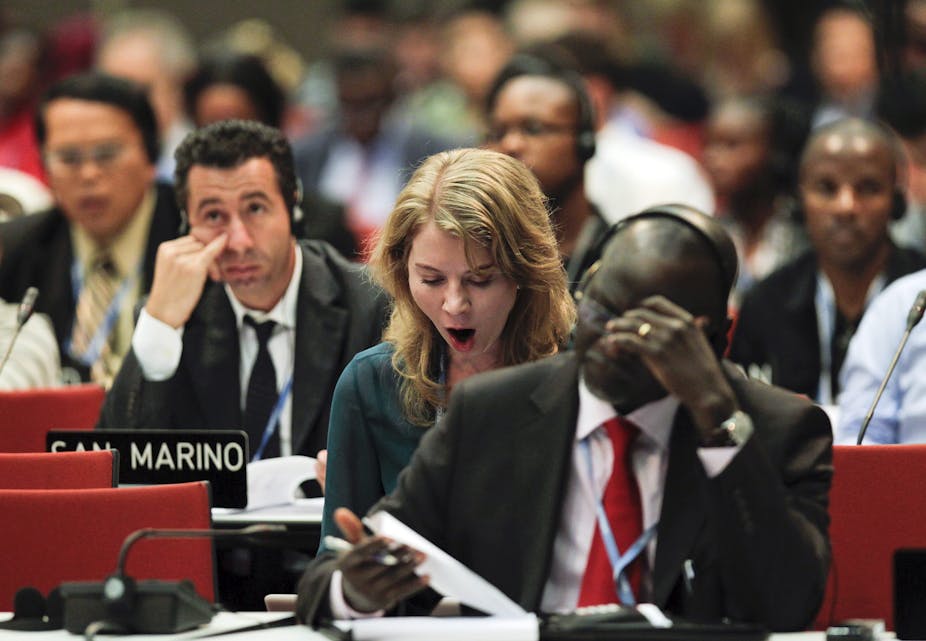Global sustainability conferences no longer fulfil a useful purpose, considering the existing dense institutional framework. We know what the problems are and need no further agenda setting. We need action.
The diminishing returns of global sustainability conferences
The 1972 Stockholm Conference was a watershed event, placing environment firmly on the international political agenda. The 1992 Rio Summit surpassed the 1972 conference in terms of process and ambition. But the aftermath showed their limitations - key promises were not delivered.
The optimism from Rio had turned to deep pessimism in Johannesburg in 2002 in the wake of the “9-11 attack”. The conference ended up re-circulating previous goals, and calls for institutional reform never materialised. Some of us believed that this would spur a more focused and differentiated approach. We were wrong.
The pre-Rio 2012 process: business as usual
Since the UN General Assembly decided to convene the Earth Summit (or UNCED) in 2012, a number of preparatory meetings have been held. But progress has been slow. Considering the existing deep-seated differences the concluding document will most likely be vague.
The detailed accounts given by the Earth Negotiating Bulletin coming out of Rio are instructive, documenting the ideological grand-standing and repetitions of well-known positions.
Most of the issues discussed are already covered by existing agreements, so the value added seems to be marginal. Conflicts loom large over long-standing issues such as national sovereignty, good governance, targets and time-tables, human rights and emission standards. Conflicts are equally pronounced on implementation,such as technology-transfer and financial assistance; these are issues that have been discussed in the UN system since the early 1970s, with modest progress.
Pulling old institutions apart, making new ones
Two more specific issues are selected for UNCED 2012; “green economy” and the institutional framework for sustainable development (IFSD). Like “sustainable development”, green economy is designed to serve as a platform for integrating environmental protection with economic growth. Northern countries and UNEP have pushed the idea, but developing countries see it as framed more in terms of Northern perspectives. In general, green economy does not seem to serve as a “silver bullet” to a new global program for earth system governance. The last negotiating meeting in early June provides an illustration: the parties reached agreement on only 1 out of 17 paragraphs.
The preparatory discussions on IFSD show mostly repetitions from the run-up to the World Summit on Sustainable Development, held in Johannesburg in 2002. The EU and followers again want to upgrade the UN Environmental Programme to a specialised agency, but as the United States and key emerging economies disagree nothing will probably happen.
Before Rio, the idea of creating a high level political council on sustainable development emerged. To the EU’s credit it has suggested that if such a council is established, the Commission on Sustainable Development (CSD) should be terminated. Since CSD has been little more that a polarised “talk-shop” for UN diplomats, this would a step in the right direction.
A high-level council may be able to mobilise the political clout to move negotiations out of current deadlocks, but so far the opposition is too strong from key parties. The most important lesson to be learned from these difficulties is that institutional reform must build on common – or at least compatible – ideas about policy directions. That platform is not in place.
We don’t need more goals, we need progress on the goals we have
Another idea that has emerged in the pre-Rio process is formulating “sustainable development goals” (SDGs). This idea has also become subject to disagreement reflecting well-known cleavages. The Rio meeting may nevertheless be able to agree on procedures for further work to flesh out the idea. What the world needs now is, however, not another set of lofty goals but progress in the implementation of specific and effective measures.
The UN has been extremely eager to establish ambitious goals, but attaining those goals has been less impressive because the necessary underpinnings have often been missing. UN conference goals have, at best, had marginal impact in making important changes in environment and development areas.
Enthusiasm for goal-making needs to be tempered with efforts to identify and develop specific measures that countries would be willing and able to implement. Moreover, a number of international organisations established for other purposes - such as the World Trade Organization and the Bretton Woods system - may make more significant contributions than these global conferences.
Keep it politically feasible
Since late 2008, concerns with economic recovery have dominated the international agenda. Arguably, this is exactly why we need the Rio meeting: to put sustainability back on the agenda. The conference will likely do so – for a few days.
One potentially important step could be to redesign the preparatory stage. For example, a few small groups of experts – including seasoned diplomats acting in their personal capacities and top researchers - may be able to help. They could transcend the well-known cleavages between a southern poverty-and-development discourse and a northern green economy focus. They could suggest new ways to integrate diverging norms and interests.
We do not need to bring thousands of participants together to confirm that the range of politically feasible solutions is quite narrow. A small invest in arrangements that could help transcend current gridlocks may yield higher returns.

